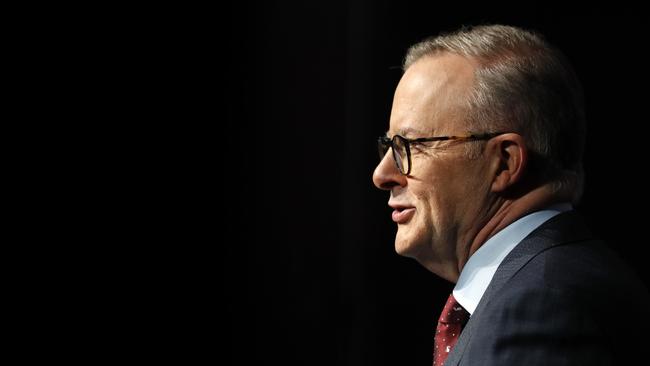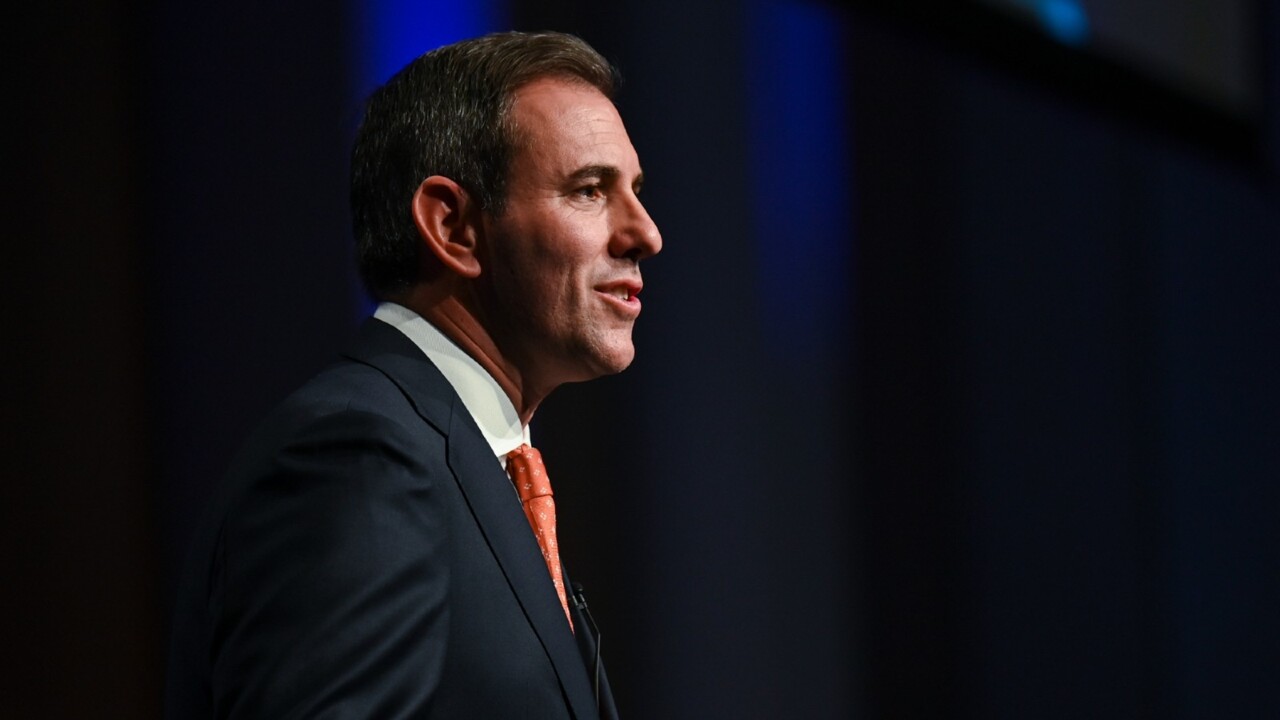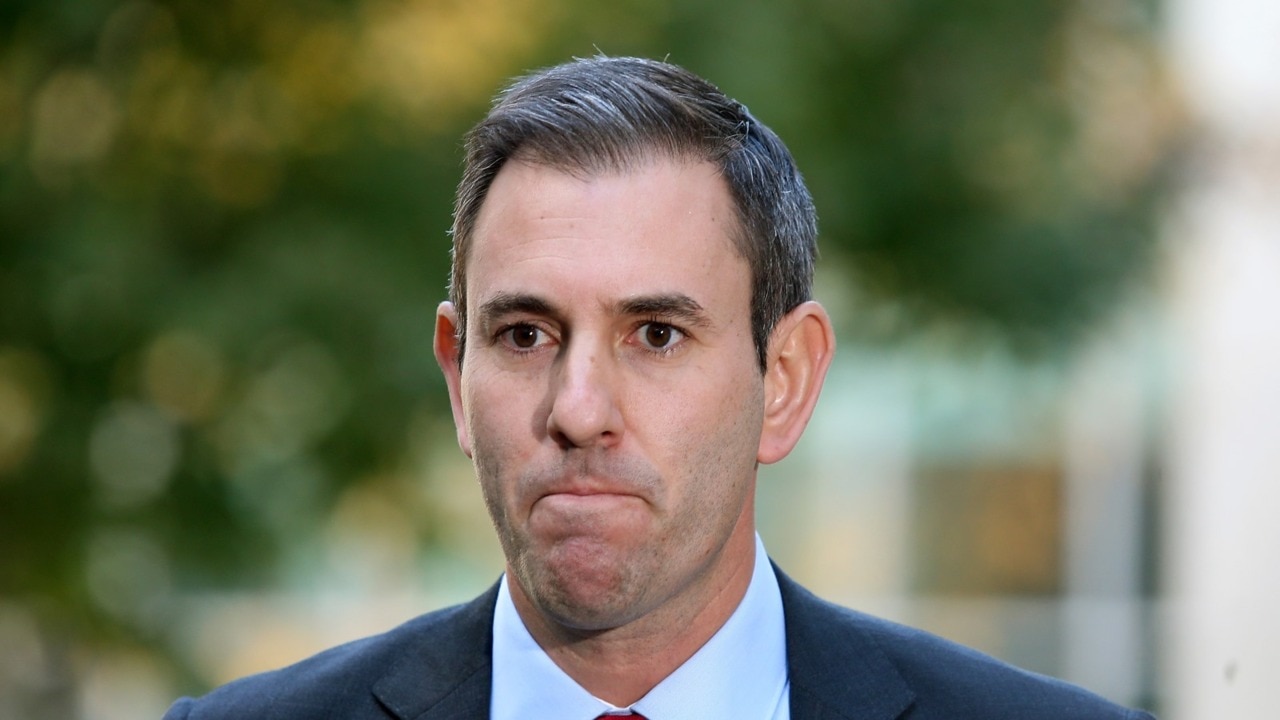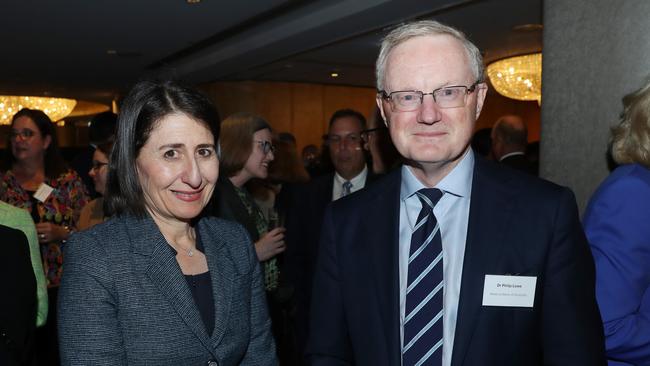From IR to ‘I need you’: Anthony Albanese’s pitch at Business Council dinner
Anthony Albanese concedes he needs the private sector to achieve his climate and economic agenda in a rallying cry to spooked business leaders.

Anthony Albanese has conceded he needs the private sector to drive and achieve his ambitious climate and economic agenda, in a rallying cry to business leaders spooked by Labor’s union-led industrial relations reforms.
Ahead of a fight over Tony Burke’s IR legislation and the release of the Intergenerational Report, the Prime Minister launched a charm offensive before corporate chiefs at the Business Council of Australia annual dinner in Sydney on Wednesday night.
In an effusive pitch to business leaders, Mr Albanese said he needed their help to realise climate change targets, future skills and jobs, adoption of emerging technology, advanced manufacturing and economic equality for women.
Mr Albanese – who wooed business leaders ahead of the 2022 federal election after pledging to end Bill Shorten’s class warfare and pursue modest reforms – has come under fire from some of the nation’s biggest industries over a suite of policies they fear will drag down productivity.
After the BCA this week released its Seize the Moment report outlining a national economic reform blueprint, senior government figures welcomed some of the recommendations but ruled out any shift on IR reforms or changes to corporate tax and GST settings.
In a speech focused on “working together”, Mr Albanese made a brief reference to the government’s IR shake-up, to be debated when parliament returns on September 4. Mr Albanese said the IR reforms – which had sparked an industry-wide campaign railing against changes to rules around casuals, labour hire staff and employee-like forms of work – established a “pro-business, pro-worker system that delivers win-win outcomes”.
The Australian understands industry representatives provided with exposure drafts of the government’s second wave of IR reforms, described by insiders as failing to address business concerns, have been forced to sign nondisclosure agreements.
Mr Albanese told industry leaders, including some who had aired concerns about the union-influenced IR overhaul, that he was “grateful to the business community for the constructive input they’ve provided on this issue”.
“There is no one decision of government – or business – that will revitalise national productivity on its own and overnight,” he said.
“It is, necessarily, an incremental process and a cumulative one. It’s one where we all need to be prepared to take the long view – and the broad view.
“(We’re) building a modern industrial relations framework that achieves the right balance of flexibility and security. A bargaining system that enables employers and employees to negotiate improvements in productivity and pay, with respect for each other’s common interests.”
But BCA president Tim Reed told Mr Albanese that many of the business leaders in the room believed the IR reforms risked worsening the nation’s already lagging productivity.
“We don’t believe that adding further risk and complexity to an already overly legalistic IR system by discouraging flexibility, will yield positive productivity outcomes,” Mr Reed said.
“Indeed, the lived experience of most in the room tonight is that it will do the opposite and instead we need to focus our efforts on simplifying the award system and going further to encourage enterprise based, win-win agreements.”

Mr Albanese said the Intergenerational Report to be released by Jim Chalmers on Thursday focused on the “transformative opportunities of the decades ahead”, guiding responses to the clean-energy transition, technology advancements, the ageing population and rising strategic competition.
The Intergenerational Report includes the economic impact of climate change on productivity, warning that higher global temperatures will reduce output by between $135bn and $432bn over the next 40 years. It says higher temperatures will reduce crop yields by up to four per cent by 2063, increase the frequency of natural disasters and slash the number of tourists.
Mr Albanese lamented a historic lack of consensus in forging forward-leaning policies and aligning the nation’s priorities to “ensure the future growth of our economy and the future health of our society”.
“This is where our government has been focused on working with the employers and job-creators and leaders in this room, across a whole range of policies,” he said. “This is where I intend to work with the business community in a structured way; focusing on those long-term objectives and realities – but also taking action together, here and now.
“Across all these areas – energy policy or migration reform, skills, trade – what we decide matters, for the decade ahead. And so does the way we decide it, the how. I can assure you, my colleagues and I don’t seek your input for the sake of appearances. We do it because we want you involved in the design and detail.”
Mr Albanese said co-operation between government and business had provided a strong economic foundation. Days lost to industrial disputes were down 20 per cent “compared to our predecessors”, inflation had passed its peak and business investment was on the rise.
Amid concerns the government will struggle to achieve its 2030 climate and energy targets to slash emissions by 43 per cent and have 82 per cent of renewable electricity in the grid, Mr Albanese told business chiefs: “We are working together to achieve this (emissions-reduction) target.”

The government has started the process to finalise a 2035 emissions reduction target, which it will use to boost its bid for the UN climate change conference in partnership with Pacific nations.
Mr Albanese said the safeguard mechanism, which leans heavily on the nation’s biggest emitters to cut pollution faster, was an “incentive for business and industry to invest in the technology and equipment that reduces their emissions”.
“Our vision for Australia as a renewable energy superpower is about more than simply increasing the mix of renewable energy in our national energy grid,” he said. “It’s about vastly reducing input costs for manufacturing, with cheaper power.”
Invoking productivity reforms led by Bob Hawke and Paul Keating, Mr Albanese said the new age of growth and prosperity would be dominated by the ability of business and government to embrace new technologies. With rapid advancements in artificial intelligence, quantum mechanics and low-emissions technologies heavily reliant on Australia’s ability to harness its world-leading critical minerals deposits, Mr Albanese said the government was taking action on investing in digital skills, regulating AI, upgrading the NBN and strengthening cybersecurity capabilities.
“But in so many ways, the big productivity gains in technology will be led by the innovation and enterprise of the firms represented in this room,” he said. “The era of artificial intelligence is going to present all of us with complexities and opportunities that we cannot foresee. And we are going to need to work with each other and learn from each other to get the best out of this technology for our citizens and our customers, while safeguarding our people and firms from its potential risks.
In an address to the National Press Club on Wednesday, outgoing Productivity Commission chair Michael Brennan warned that governments must lift their productivity performance. Mr Brennan said expanding health, education, aged care and disability government services were “too big to be exempt from potential future productivity gains”.









To join the conversation, please log in. Don't have an account? Register
Join the conversation, you are commenting as Logout